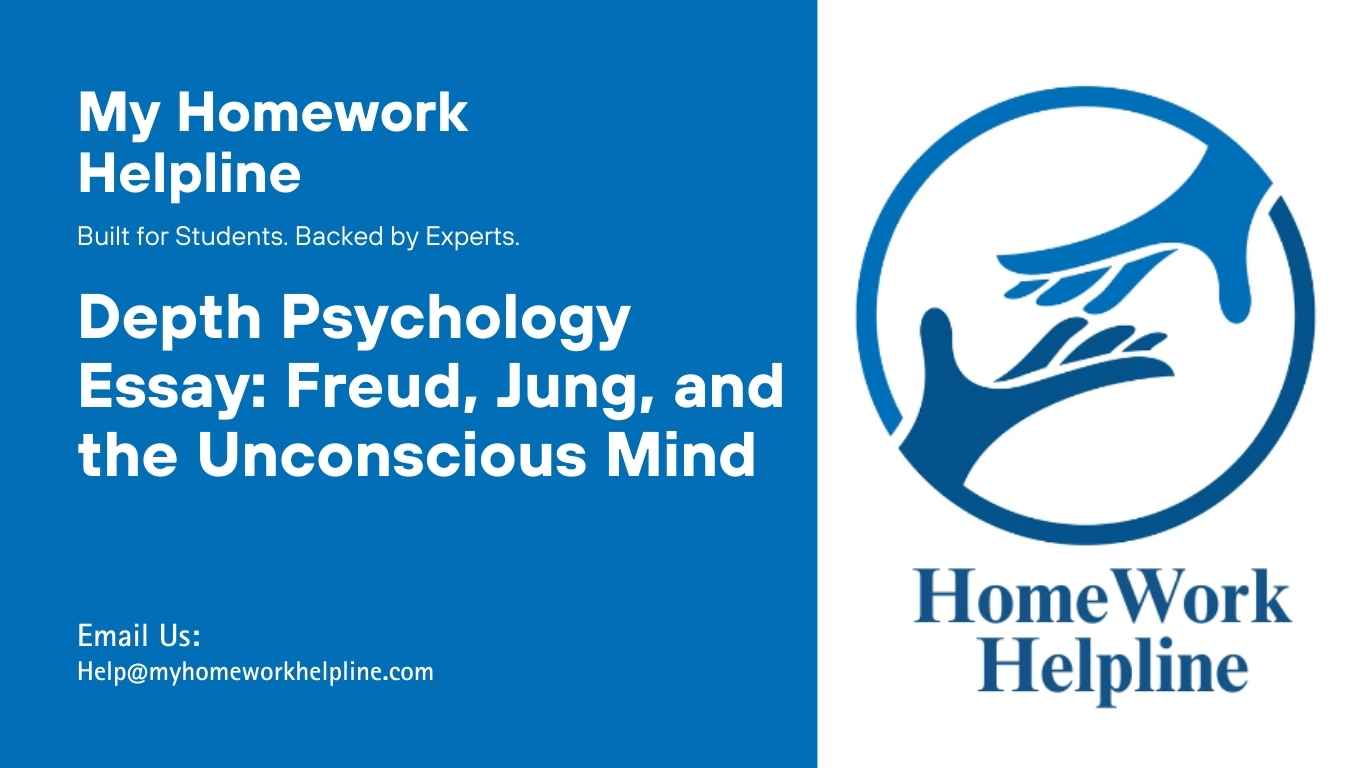Understanding Depth Psychology: Freud, Jung, and the Unconscious Essay
Depth psychology is a term used to define therapy strategies that explore the subtle, transpersonal, and unconscious aspects of human experience. According to Walsh (1997), in psychology, a depth approach can entail the use of therapeutic traditions that explore the unconscious and encompass the study and exploration of complexes, dreams, and archetypes. The field tends to be strength-affirming and non-pathologizing. This paper aims to examine Freud’s and Jung’s views of Depth psychology, enabling us to understand how we relate to each other, ourselves, our culture, our planet, and our species. However, implementing this type of psychological intervention in modern society is relatively complex since it takes more time to address the feelings of anger, shame, fear, and anxiety.
Understanding the unconscious mind and depth psychology can be complex, but expert guidance makes it accessible. Whether you’re writing a Depth Psychology essay, a research paper, or a psychology assignment, our team provides professional psychology homework help to help you analyze Freud and Jung’s theories, explore archetypes, and understand the role of dreams and symbols. Gain clarity, enhance your academic work, and complete your assignments with confidence using our specialized support for psychology students.
The conscious mind is only a tiny portion of ourselves that really exists. According to Walsh (1997), the ego self refers to the self that we can observe and be aware of; this is only a tip of an iceberg that is covered in a sea of unconsciousness. Feud introduced the idea that everyone experiences events from an unobservable world of secrets, doubts, hidden, and fiction that our consciousness tends to repress. The repressed issues result in feelings of anger, shame, fear, and anxiety, for which the origin is mostly not uncovered or acknowledged. Humans tend to experience the self as something we have, which is a formed component that is observable, constant, and reasonably unchanging. The self we tend to see is a construct of past events, beliefs, relationships, emotions, judgment, and values that build up majorly during early childhood, shaping the current self and tending to influence our decisions, thoughts, and actions strongly. Feud explains that during our early childhood, we gradually take form and rhythm, and we can slightly imagine the object or states that can bring us relief, which is usually short-lived. We tend to be vastly influenced by immense hidden aspects of our childhood, which have been deeply embedded in our unconsciousness. Since our unconscious is unknown, our know identity is confined and limited. We are primarily influenced by a significant hidden portion of the great self within us, largely unseen or out of our understanding.
Depth psychology aims to reveal or uncover hidden aspects of ourselves. This can be viewed as opening curtains from inside the limited existence we live in through the daily self we understand and out onto the depths of the soul. Additionally, Depth psychology closely associates with Jungian psychology based on the massive influence of Carl Jung’s contribution, where he touches on the experience of mystery, sacred, and the ineffable, an approach that aligns with symbol and myth with the spiritual and religious traditions of the world, archeology, and anthropology, poetry, with art, and literature (Walsh, 1997). Like his mentor, Feud, Jung, explained that the unconscious is built from autonomous instincts, archetypes, behaviors, or patterns, which tend to be shared across all peoples, eras, and places. Architects, therefore, organize the compositions of the unconscious and interconnect it to nature at its deepest levels. He also believed that the language of archetypes is manifested in images and symbols, which tend to influence us to get into relationships with them and to involve ourselves in reciprocal acts of change.
While depth psychology is effective in helping people, it requires time. The strategy requires an understanding of people’s dreams and the unconscious. It requires an understanding of people’s dialog, and their interaction with symbols, in the imagination realm through dream analysis made through depth-focused research of cultures’ stories and myths. Therefore, for the ultimate transformation of individuals, one has to ensure they encounter these aspects to generate awe, rapture, power, and understanding. In addition, a specialist has to understand different cultures as riddled with traditions and symbolism. This is because these aspects tend to influence an individual’s psyche. Depth psychology tends to respect individuals’ inherent nature, also of each culture, which encompasses how individuals interact with different cultures, groups, nations, and the planet. Other factors that a specialist has to take into consideration include myth and nature (Walsh, 1997). These factors have also been found to influence how people interact. While depth psychology encompasses vital information that can allow individuals to transform, it also requires a comprehensive understanding of a wide array of information. Thus, when understanding of symbols and traditions is limited, transformation cannot take paces as individuals are unable to encounter the power of the unconscious.
In conclusion, Feud and Jung helped in the development of dethpsychology. Both scholars understood the importance of the unconscious mind and how it influences our behavior toward other people and nature. Thus, understanding their theories can help individuals change their perspective on life, transforming how they interact with their surroundings addressing the feelings of anger, shame, fear, and anxiety. However, for this breakthrough to occur, a specialist must be informed of an individual’s culture and every aspect around them that influences their decision. Therefore, the theories are based on knowledge, which can limit transformation. Additionally, for transformation to take place, it requires a significant amount of time. I believe that our unconscious plays an essential role in how we make our decision, and depth psychology helps us become more aware of ourselves.
References
Walsh, R. (1997). ” Psychology of religion: Classic and contemporary”, David Wulff (Book Review). The Journal of Transpersonal Psychology, 29(1), 73.

